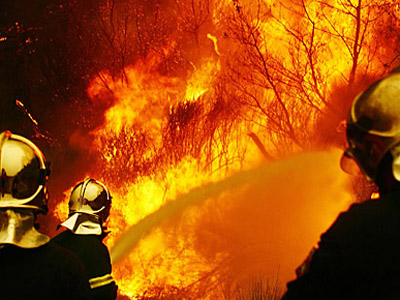
As Greece battles to address the aftermaths of its catastrophic forest fires, some environmentalists are pondering their potential impact on climate change.
The fires, extinguished in early September after running for nearly a fortnight since August 24, killed at least 66 people around the country, destroyed hundreds of homes and burned thousands of hectares of forest and agricultural land.
"Global [carbon dioxide] emissions from deforestation and the degradation of forests are the second single source after coal" of global warming, Stefan Singer of WWF, the global conservation organization, told Reuters.
Every year, 13 million hectares of the world's forests disappear, an area the size of Greece, according to the UN Food and Agriculture Organization. The organization said deforestation accounts for 18 percent of carbon dioxide emissions.
Although paling in significance next to deforestation of the Amazon Rainforest in Brazil and in Congo and Indonesia, forest fires in the Mediterranean might also be a net source of emissions, experts said.
But the fires in Greece are only part of the story. Concerns over climate change have grown in the wake of frequent outbreaks of natural disasters and extreme weather events in recent years.
Huang Lei, a researcher at the National Climate Center of the China Meteorological Administration, underscored the trend that extreme weather events are becoming more frequent and devastating worldwide.
A report released in August by the World Meteorological Organization (WMO), the UN's weather agency, said that many regions of the world have experienced record extremes in weather and climate, including unusual floods, heatwaves, storms and cold snaps since the beginning of this year. Data gathered by the organization show that January and April had the warmest global land surface temperatures this year since records began in 1880. Temperatures during the two months were 1.89 degrees Celsius warmer than average for January and 1.37 degrees Celsius warmer than average for April.
Huang pointed out that global warming, which is now an undisputable fact, has a great bearing on extreme climate conditions. It has not only led to the continued rise of average temperatures, but also resulted in a widening gap between the maximum and minimum temperatures, he said, adding that both factors may trigger extreme climate events. Although climate change results from both natural and human factors, scientists commonly believe that changes in solar radiation are not the primary cause, he said.
The Intergovernmental Panel on Climate Change (IPCC) concluded in its Fourth Assessment Report in 2007 that human actions are "very likely" the cause of global warming, meaning a 90 percent or greater probability, Huang said.
The UN, through the UN Environment Program and the WMO, established the IPCC in 1988 to investigate and analyze the best published scientific research on global warming. Since 1990, the IPCC has produced reports every five or six years assessing the state of this scientific research through observations and forecasts of future trends.
According to IPCC reports, the earth's average surface temperature from 1906 to 2005 rose by around 0.74 degrees Celsius, with more warming over land than oceans. The average warming rate over the last 50 years was nearly twice the rate for the last 100 years. The late 1990s and early 21st century saw the warmest years since modern records began. A further warming of about 0.2 degrees Celsius per decade is projected for each of the next two decades. Atmospheric concentrations of carbon dioxide are greater now than at any time over the last 650,000 years.
The IPCC found that one of the most dramatic consequences of global warming was the rise in sea levels, which increased by around 17 cm during the 20th century. Geological observations indicate that they rose far less during the previous 2,000 years. By the end of the 21st century, average global sea levels are projected to rise by 28 cm to 58 cm over 1989-99 levels due to ocean expansion and glacier melt.
| 